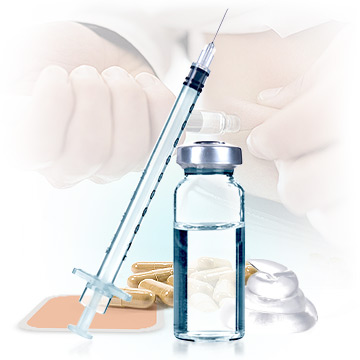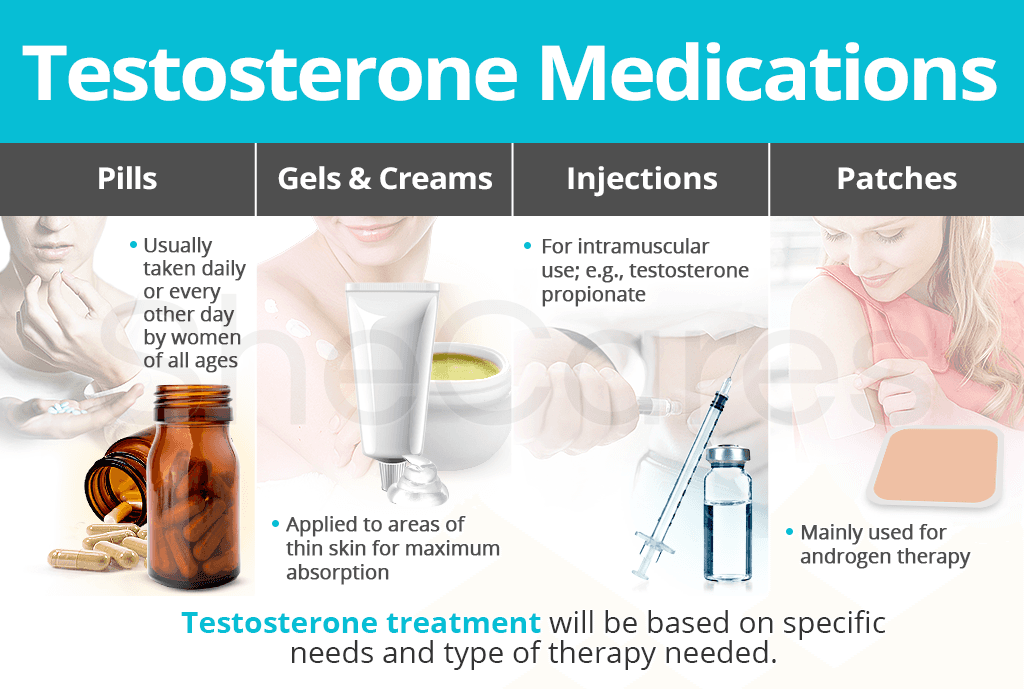When a testosterone imbalance is confirmed through testosterone tests, women may choose from a variety of options to remedy the hormone's levels. Aside from lifestyle changes and natural treatments, there are a wide variety of testosterone medications to pick from.
Continue reading to learn more about taking testosterone medications as well as under what circumstances entail the need for testosterone treatment.
Taking Testosterone Medications
There is no FDA-approved form of testosterone for treating sexual disorders in women. The various testosterone medications and products available should only be prescribed to women in small doses and if blood testosterone levels are closely monitored.
A woman may use testosterone by taking a pill, rubbing on a gel or cream, administering an injection, or applying a patch.

- Testosterone Pills. Taking testosterone is usually done daily or every other day. It is one of the few medication methods used by women of all ages, not just postmenopausal.
- Testosterone Gels & Creams. These are compounded testosterone creams and pure testosterone creams and gels. Both should be applied to areas of thin skin for maximum absorption.
- Testosterone Injections. Injections, such as testosterone propionate, are for intramuscular use. They are generally used to treat sexual disorders in postmenopausal women.
- Testosterone Patches. Testosterone patches are also mainly used for androgen therapy in women. However, their efficacy in comparison to other means is often questioned.
Keep in mind that there is a diverse range of benefits and potential testosterone medication side effects. It is imperative to understand the implications of each method completely before pursing treatment.
When Do I Take Testosterone?
Because testosterone's long-term safety for women is still unknown, some doctors are hesitant for patients to begin taking testosterone. Additionally, testosterone treatment is normally only pursued in those with sufficient estrogen levels.
Testosterone treatment is generally appropriate to pursue under two circumstances, for women who are taking oral estrogen therapy, as estrogen can reduce testosterone production, as well as most commonly for postmenopausal women.
If a woman in surgically induced menopause and has reduced sex drive, depression, and fatigue, and estrogen therapy hasn't relieved symptoms, her doctor may start her off on a low dose and monitor her accordingly. The same goes for postmenopausal women who are taking estrogen and have low libido but no identifiable causes.
A registered healthcare professional will prescribe a woman the exact dosage of testosterone she needs and provide her with a treatment schedule based on her specific needs and type of testosterone treatment required.
Just like with the use of any prescription program, there is an increased risk of adverse side effects, further exacerbating a woman's hormonal harmony. To avoid these side effects, consider the use of less risky natural testosterone supplements and boosters.
Sources
- Bolour, S. & Braunstein, G. (2005). Testosterone therapy in women: a review. International Journal of Impotence Research, 17(5), 399-408. retrieved August 10, 2018, from https://www.ncbi.nlm.nih.gov/pubmed/15889125
- Harvard Health Publishing. (2013). Testosterone therapy: Is it for women? Retrieved August 10, 2018, from https://www.health.harvard.edu/womens-health/testosterone-therapy-is-it-for-women
- Mayo Clinic. (2016). Testosterone therapy in women: Does it boost sex drive? Retrieved August 10, 2018, from https://www.mayoclinic.org/diseases-conditions/menopause/expert-answers/testosterone-therapy/faq-20057935
- Morley, J.E. & Perry, H.M. (2003). Androgens and Woman at the Menopause and Beyond. The Journals of Gerontology: Series A, 58(5), M409-M416. doi: 10.1093/gerona/58.5.M409
- National Women's Health Resource Center. (n.d.). The Reality behind Testosterone Therapy. Retrieved August 10, 2018, from https://www.healthywomen.org/content/article/reality-behind-testosterone-therapy

